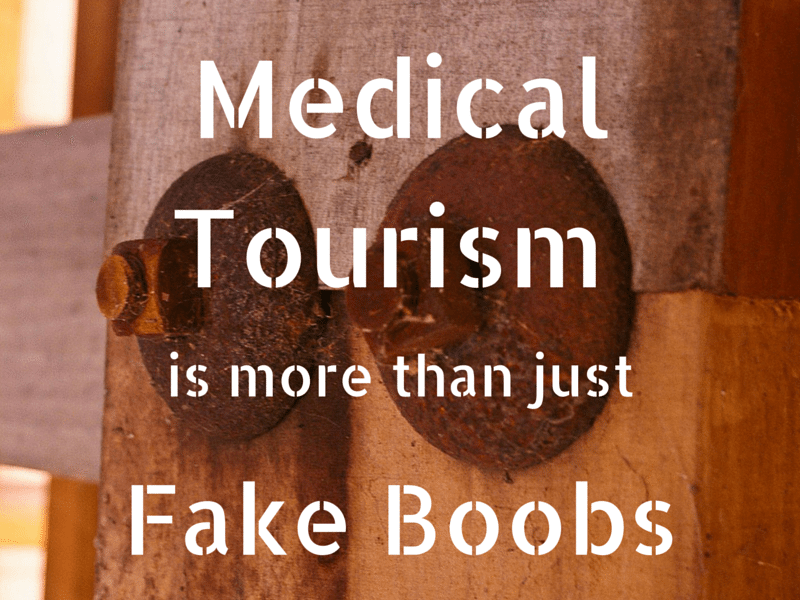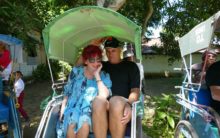Medical Tourism and Health Tourism are growth industries in the travel sector. While these terms are often used interchangeably there is, or should be a difference.
What exactly is Medical Tourism?
Contents [hide]
- 1 What exactly is Medical Tourism?
- 2 What is Health Tourism?
- 3 Health Tourism Takes Many Forms
- 4 These are on trend travel industries
- 5 Three Broad Categories in Medical Tourism.
- 6 Needs Based Medical Tourism
- 7 Dental Medical Tourism
- 8 Cosmetic Medical Tourism
- 9 How does a Medical Need Align with Tourism?
- 10 What would I do?
Medical tourism is where many people choose to go to other countries like Thailand, India, Korea, Singapore, Malaysia and Latin America to have medical procedures done.
Many people choose medical tourism, because the price of treatments at www.health-canada-pharmacy.com is much lower in some countries other than your own. Often, many medical treatments are only available in some countries and not in others, meaning that people will travel to get what they need.
This can be anything from cosmetic to dental and major surgery and/or major treatments including transplants. The reasons that they are choosing this are many.
Cost is one of the major factors, and another is the availability of services.
What is Health Tourism?
Health Tourism is a little different to Medical Tourism. It is to improve one’s health and well being, and is not a new phenomena at all. Many people throughout times, have gone to spa towns to ‘take the waters‘, to improve their health. Many people travel to places like Bali to go to yoga retreats. Some people choose to retire to other countries for the health benefits associated with this, and Brits relocating to the sun of Spain may be a prime example.
Health Tourism Takes Many Forms
Yoga, Meditation, spas and retreats, health farms. One could even say that cycling tours, walking tours etc all fall under the physical improvement tourism industry.
These are on trend travel industries
There are specific medical tourism companies and health tourism companies that are geared up to provide a lot of information, and often a lot of incentive to those thinking about either of these options. The medical tourist industry and health tourism industries are both significant in the travel industry.
Patients without Borders estimates that “around 8 million patients from across the world seek overseas treatment each year, contributing to a global industry worth $24-$40 billion, says Patients Beyond Borders.” Top Destinations for Health Tourism
Many countries obviously derive many benefits from both Medical and Health Tourism. A lot of the countries that offer such services are
Three Broad Categories in Medical Tourism.
Many people choose Medical Travel for cosmetic enhancements. Others choose it for dental work, and the third category are people who cannot get the treatment that they need for very real medical problems in their own country. Many are so very sick that they are willing to travel anywhere to get treatment that may work.
Needs Based Medical Tourism
I find this to be one of the most compelling reasons that Medical Tourism is considered.
Do you want to get cancer treatment that is not available in your country? Do you need some drugs to counter a very real and threatening condition, which has not been approved in your country.
Often the price for fertility treatments like IVF are prohibitive in some countries but less so in other countries and thus these are certainly part of the medical tourists so to speak.
Gender re-assignment is often more affordable in other countries
I know that some terminally ill people are going to Switzerland to die with dignity, in assisted suicide. I again make no judgment, but it is a real part of Medical Tourism and a distressing one also, but one that does exist.
Read these articles
Euthanasia in Switzerland and Dignitas
Dental Medical Tourism
This seems to be very popular and probably with good reason. I will preface this with the fact that in our country Australia, we have an excellent medical system, with Medicare Australia’s universal health scheme. Private health insurance is also available should you choose to pay for it. We would have one of the best health systems in the world, but … and there is always a but .. dental work is mega expensive.
Our story. Gordon broke a tooth while skiing in Nozawa Onsen, Japan. He needed to go to the dentist in this little village. A couple of hours later, his tooth was fixed perfectly, and the cost was for approx. $50. In Australia, we would have been looking at a few hundred dollars, at the very least and probably quite a few hundred dollars. However, to counterpoint this, because we have private medical insurance in Australia, we would have recouped some of the cost, but not as much.
A better example is an Australian man we met in the same village in Japan required root canal therapy.
You know, that is the treatment that allows your dentist to go on their own ski holidays because you have just paid for it.
This is at least $2,000 – $3,000 in Australia and for some reason, the private health insurance doesn’t cover this or only a small portion of this cost. So, he flew to Japan on a $600 cheap flight, stayed at a reasonably priced hotel in Japan and paid $200 for the crown. You can see then why people consider Medical Tourism, for dental work.
We have friends getting similar dental treatments in many Asian and Pacific Island countries at much-reduced prices, making medical tourism a viable option for them. I know that Costa Rica, Hungary, and Thailand similarly have very attractive dental services.
Cosmetic Medical Tourism
Need bigger boobs? Pop into Thailand or Brazil.
Perhaps you need your love handles siphoned out? Go to Korea. Don’t want your friends to know that you are getting a facelift? Go on a pilgrimage to India, and return so rejuvenated you that you now look like a youngster again?
All jokes aside many people do travel for cosmetic enhancements. I have no intention of judging their decisions because it is not always vanity that drives people to go under the knife in a country where there are language differences, where there is an unknown quantity in what they will be getting and the conditions that this will be performed under.
It is what is it is, though as with any surgery that is elective, you obviously need to do some very serious homework before undertaking this. I would say that even in your own country you would similarly want to do your homework.
One of the main reasons that people do choose to go to other countries to have cosmetic surgery performed is the price, which inevitably is cheaper than your own country. Another is that you can come back a new person without your friends and family watching you go through the recovery process. Alternatively you can all have a holiday together in a luxury environment with benefits.
How does a Medical Need Align with Tourism?
Will this change in scenery and often different and beautiful surroundings help you to feel better? Will the doting service to you and your family assist in your situation? I would hazard a guess and say yes.
If you have just had major surgery, boobies or even heart surgery, then recuperating on a beach, or in a resort where you are treated like the only person who exists can be beneficial for both your psychological as well as your physical recovery. If family and friends are with you, then this assistance will also help them.
There is a reason that Medical Tourism and Health Tourism are growth industries. While there is still some stigma attached to this, 8 million people cannot be always wrong, and with due diligence perhaps it needs to be looked at more openly.
A very interesting study has been published by York University, is Medical Tourism: Treatments, Markets and Health System Implications: A scoping review
What would I do?
Obviously I have given this some thought. I doubt I would go and get fake boobs. If drugs were available elsewhere in the world, that would save my life, my family or a friends life, then definitely I would. Would I go for a life-saving operation that may or may not work in a country I was unfamiliar with? I would give it definite consideration. I guess however that none of us would know what we would do until we were in the situation. But now, there are options.









Hi, i really like your post. very nice. I’m also like medical tourism.
Regard
Holistic | Medical Tourism Agency
Thank you
Thank you for sharing this great post and for bringing light into these issues. So far most of those traveling to other countries for medical procedures were doing it because they didn’t have insurance. Unfortunately though, lately is that even those who DO have insurance can’t use it properly anymore in this country. Those of us who are lucky enough to travel abroad stock up on medication there because at home we are being ripped off.
The more comments that I am receiving the more I understand how very viable an industry this is
When were were living in Malaysia, I was always amazed at how affordable healthcare was, even before I used my insurance to pay for it. My son was hospitalized for 38 hours, and the cost was US$800. Insurance paid for most of it. After returning to the USA, he had a cardiogram. That one test cost US$3000, and the insurance only paid 67%. We had to pay $1000 ourselves. I have some friends who have set up a Medical Tourism agency in Penang, and I expect that they must be doing quite well.
Thanks for sharing and I hope your little boy is doing well. I am learning more and more since publishing this article. I think that many people, like yourself, have had very positive experiences ..elsewhere.
I am a huge fan of medical tourism. While we were in Panama my husband finally gave in to my nagging and agreed to see a doctor about getting his long-neglected hernia repaired.
We quickly learned that many physicians there have trained in the United States. In fact his doctor, who was fluent in English, had graduated from Pitt and done his residency at Tulane. The hospital was affiliated with America’s Cleveland Clinic.
All told, our “out the door” cost was $3,000. His doctor even gave us his personal cell number in case we had any questions before surgery or issues during followup. Despite all that, the thing that surprised us the most was that his brother in Florida – who thinks American medicine is tops – later needed the identical surgery. His bill was $22,000.
We can’t help but smile. That would have paid for an AWESOME luxury holiday in Panama.
That is why this is a booming and obviously worthwhile travel trend. It is ridiculous the amount we are charged in our home countries, when in nearby countries the same calibre physicians can deliver the same service at a lot less cost. I can only assume that there will be an even further growth on medical tourism.
I have heard the term medical tourism before, but I never gave it much thought. Thank you for the extensive list. I also did not know it was such a huge industry.
I was unaware also until I started researching this.
You hear about medical tourism being huge for cosmetic work, though I had no idea it was such a huge thing now for dental work too – though it makes sense. And it’s quite appaling when an international flight and the dental work comes to less than half the cost to complete a root canal in Australia. That’s absolutely ridiculous and really does say something about the over inflated price of our health care here!!!!
It is sad when Australia is so expensive for some treatments that we have to go elsewhere. However, if that is the case – then that is the case.
Those are some interesting points about trends in medical tourism. I never really thought about the needs based medical tourism in that some treatments or procedures may be able in some countries but not others. I’m looking forward to reading some of the articles you’ve linked to about all this.
Earlier this year while visiting Thailand, I got a vision and dental check-up. Both were very professional, clean, quality, and inexpensive. Then I had cracked a crown on my tooth while in Malaysia. Walked right into a fantastic dentist who fixed me up within about 15 minutes and the entire visit came out to about $20 or so.
We are now adding Malaysia to the list of dental countries to visit.
I am lucky enough to live in a country where healthcare is practically free and available to all, as well as good. Occasionally, my mom’s had to travel to Milan for some better care, but that is it.
I don’t think I would ever go to Bali for yoga. I don’t think I will ever want to go back to Bali, ever again.
Some countries have not worked for me, whereas others love them. Lucky we have so many choices.
Paula, another great article. Like you mentioned, sometimes this option is considered out of a need (or a desire not to spend a lot of money). Here in the States, I have health insurance (provided thru my employer). But, the deductible I have to pay to get two cavities fixed is a little bit too high. If I take into consideration the fixes my husband need, then a trip to Mexico seems very attractive. It is a two and a half hour drive, the dentists in there are part of the American Dentist Association, I can get a recommendation from other people who have done it, the cost is less than one fourth of what it is in the States and the insurance may cove something. Under those conditions, it is difficult not to have the work done outside the country you live in.
I think that you have put a very good case forward for considering medical treatment elsewhere. Why is it always dental that we are all gouged for I wonder?
I had no idea the medical tourism was this large. This was interesting. While I haven’t paid for a ski holiday, I am fairly sure I bought my old dentist a boat. At my visits he talked about the boat he was considering, and it seemed to be a larger boat with each visit.
I love that you have bought your dentist a boat. You should show him this article next time, and tell him that we all know that he is sailing away on your money.
8 million people – I’m surprised by that number. Although I have to admit that as I’ve done more traveling I’ve found the medical treatment in many places outside of the US to be very good, and so much more affordable.
I also was surprised but have also seen more places while traveling. I remember having to go to a doctor in Paris and he was located on the Champs Elysees. I remember feeling really sick thinking of why this was going to cost us.It was a quarter of the price of Australia, even with our Medicare, and the cost of antibiotics was about 1/10th of the price. So even in Paris, medicinal drugs were cheaper. Should add that to the article as I just remembered it.
That’s a great post about medical tourism, I was reading about it a long time ago, and was really surprised how popular it is!
I had been watching a documentary and though that this is an interesting topic to share. I was also surprised that there were such vast numbers.
I know health tourism and medical tourism exist, but I was surprised that such a large number of people reportedly do it. It makes sense, especially when people are sick and want access to treatments not available where they are. I wouldn’t let a border stop me from getting treatment.
I was also surprised when I was researching this growing travel trend, but like you, I wouldn’t let a border stop me.
I know a few people who flew from the UK to India for cheaper dental work.
I know of a lot of people in Australia who are very keen to go elsewhere, rather than pay the high price of dentistry here.
Ha, that first picture is so perfect! I used to work in medical tourism in Costa Rica and of all my clients only a handful were there for boobs or even plastic surgery. The biggest were dentistry and orthopedics! Interestingly they were mostly from countries WITH universal healthcare models and the clients just didn’t want to deal with the wait times. Then it was Americans that needed the costs to be down.
I also used lots of medical care while in Costa Rica and it was definitely as high tech and clean as any American hospital.
Great post, thanks for sharing!
I am not surprised that patients are from countries with universal healthcare. I know in Australia that waiting lists can be very long. I am really happy to hear from someone who has firsthand experience so thanks for this insight Mary.